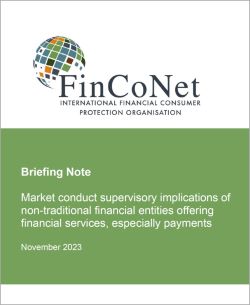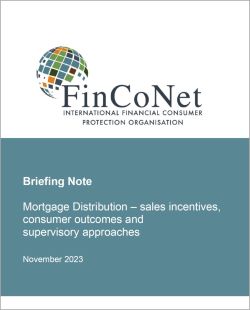Established in 2013, the International Financial Consumer Protection Organisation (FinCoNet) is an international organisation of supervisory authorities which have responsibility for financial consumer protection. Read more...
Market Conduct Supervisory Implications of Non-traditional Entities Offering Financial Services, Especially Payments
 |
Download (PDF) The market entry of non-traditional financial entities (like FinTech firms) and large non-financial operators (i.e., BigTechs), which make intensive use of new technologies in the design and marketing of financial products and services, with additional and integrated functions, is resulting in a boost to the digitization of the sector and a reported increase in competition in the banking and financial sector. In this rapidly evolving context, new risks arise for customers, and further challenges are being faced by market conduct supervisors. This briefing note aims to explore the importance assumed by NTEs entering the payments ecosystem and financial services market more broadly, identify particular risks for consumer protection and the challenges faced by market conduct supervisors and collect market conduct supervisors’ approaches and initiatives. |
Mortgage Distribution - Sales Incentives, Consumer Outcomes and Supervisory Approaches
 |
Download (PDF) Entering a mortgage is a significant financial decision for any consumer. The offer and sale of mortgages that meet the consumers’ objectives and needs is important to ensure appropriate consumer outcomes over the life of the loan. At an economy wide level, appropriate consumer outcomes regarding mortgages help underpin the stability of the financial system. Market conduct supervisors are responsible for identifying poor market conduct and driving improvements to consumer outcomes. This Briefing Note, informed by a survey of market conduct authorities, explores risks to consumer outcomes associated with mortgage distribution practices. These include sales incentives, bundling and/or tying practices, and distribution through digital channels. Supervisory approaches on each of these topics are discussed, including case studies and research.
|




